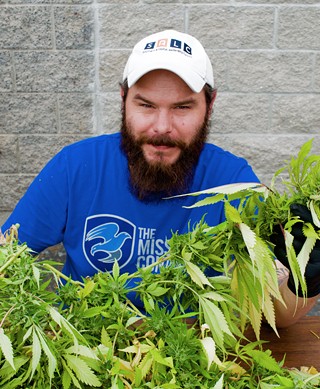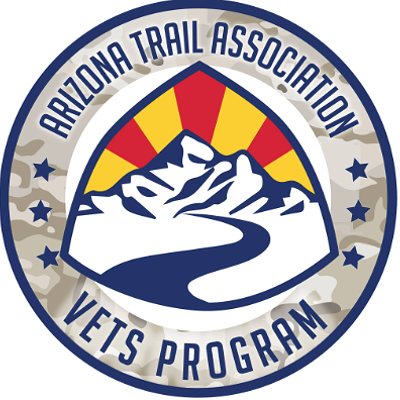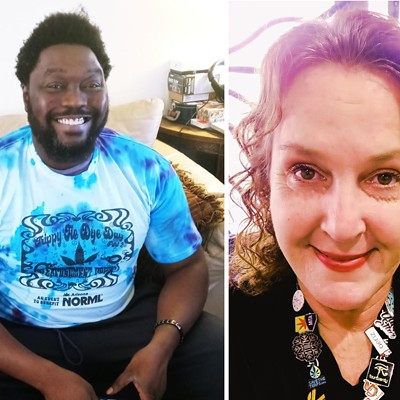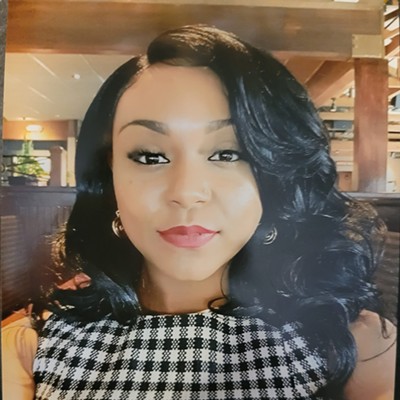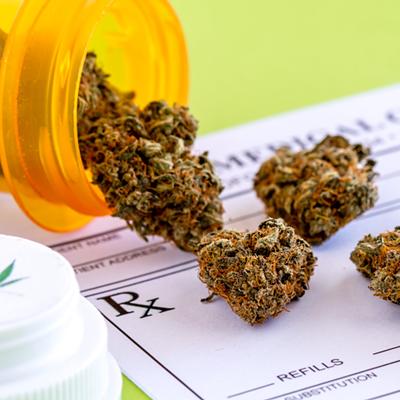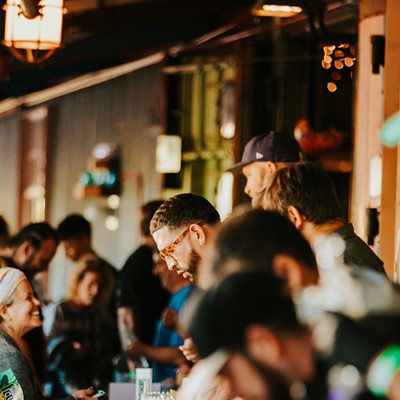A group that started with with an online "buddy check" during the height of the COVID shutdown is taking a serious swing at the Veterans Administration's rules regulating medicinal pot, seeking to challenge the federal prohibition against cannabis use in vets suffering from PTSD and pain associated with their service.
A pair of Tucson cannabis advocates have joined a nationwide group of veterans lobbying to end stigmatization of medical pot use in qualified patients and gain fully funded access to it from the VA.
"We started meeting, just getting together as a buddy check-in with Zoom meetings," said Veterans Action Council member Tony Landry. "In time it developed into some initial work, and we sent a letter out to help Sean Worsley get out of jail."
Worsely is a disabled and decorated Iraqi War veteran suffering from PTSD and traumatic brain injury who possessed a valid MMJ card in his home state of Arizona, but was arrested in Alabama for possession in 2016. He was released on a plea agreement at the time, but his life began to spiral and last year he received a five-year prison sentence in Alabama.
He was granted parole last October, though, after serving eight months in prison.
The VAC letter may or may not have affected the outcome of that case, but the action galvanized the loose affiliation of veterans to set bigger goals in service of U.S. military veterans.
One of the main organizers of the group is Army veteran Ricardo Pereyda, a Tucson native who's been advocating for veterans's access to medical marijuana since 2013.
Pereyda survived several injuries in his six years of service and came home 100% disabled due to injuries sustained in Iraq. The VA prescribed a heavy drug regimen—a common theme for injured returning warriors—but he finally found relief in cannabis, which also helped him kick his alcohol use.
"The VA and the military told me to go find a hobby, and they gave me a full pension," Pereyda said. "I could literally sit on my ass all day and just flick boogers at the wall if I wanted, [but] I can dedicate my entire focus and my energy to this because I don't have to worry about slaving at some fucked up job while I'm doing it."
A good chunk of his focus and energy has gone to laying a foundation for high-level lobbying for destigmatized access. Earlier this year, the VAC published its "2021 Green Paper: A Call to Action," a white paper that lays out the case to end the U.S. "prohibition of medical cannabis."
Stating the VAC mission, "Doing what needs to be done to provide safe and affordable access to natural medicine and alternative therapies for veterans," the paper "outlines significant concerns within the medical cannabis community, and what we feel are some potential remedies."
The paper's executive summary takes issue with the VA's overprescription of opiates and other pharmaceutical drugs and calls on the VA to "fully recognize cannabis as a viable treatment option for U.S. veterans."
"Multiple attempts have been made to resolve the inability of veterans to incorporate cannabis into their official treatment plans," the paper states. "Every attempt made to address our concerns has been sabotaged at the federal level. The VHA (Veterans Health Administration) must take action on this issue. Federal leadership in the executive and legislative branches of our government must understand the enormity of this situation."
The paper also addresses the need to help vets who self-medicate and address the number of suicides, estimated at 22 per day, according to numbers provided by the VA to the VAC. Since 2001 and the advent of the Global War on Terror, an estimated 30,000 veterans have committed suicide, while 7,032 have died on the battlefield, according to a recent Department of Defense report.
The VAC also advocates for Department of Agriculture support of veterans growing cannabis both for research, and to someday stock VA-sponsored dispensaries.
Despite medical legalization in 36 states and four territories, and expanding adult-use recreational legalization that now reaches 18 states, two territories and the District of Columbia, veterans with MMJ cards in their own states face prosecution on a federal level in states where it is not legal, as well as stigmatization by the VA when they seek health care.
"The VA has a responsibility for our health, and they're not doing it," Landry said. "They're not fulfilling their duty, so it's time to get all these ducks in a row and get the stigma blocked because the stigma is still bad surrounding cannabis."
Last week, the VAC took its agenda to the office of Sen. Mark Kelly, who in the run-up to the 2020 election voiced support for legalization on a federal level, although his support has recently cooled.
In October 2020, Kelly told KPNX-TV in Phoenix he would likely vote in favor of Prop 207 and further that he would "seriously consider" descheduling cannabis on a federal level, thus removing legal restrictions on banking and interstate commerce.
"I think I'm gonna vote yes. It has some provisions in there to decriminalize it and address some incarceration rates for marijuana offenses—I think that's good," he said of the proposition that legalized adult-use in the state. "I think there's a funding source there. So I'm probably gonna vote yes.
Kelly added: "Based on my vote here in Arizona, I would seriously consider removing it [from Schedule I]."
The group met last week with former congressman Ron Barber, Kelly's southern Arizona director, and Katie Campbell, his legislative director.
"What we agreed to do was to take the input back to the senator for his consideration," Barber said of the conversation. "I am specifically focusing on the bill by Sen. Schatz."
The bill to which Barber referred is Hawaii Sen. Mark Schatz' Veterans Medical Marijuana Safe Harbor Act, introduced earlier this year that would allow the VA to legally prescribe marijuana to veterans. The bill is cosponsored by Sens. Tim Kaine (D-Va.), Bernie Sanders (I-Vt.), Jeff Merkley (D-Ore.), Ron Wyden (D-Ore.) and Jacky Rosen (D-Nev.). There is a companion bill in the House of Representatives, cosponsored by Representatives Barbara Lee (D-Calif.) and Dave Joyce (R-Ohio).
Barber worked with Pereyda when Barber was briefly a member of Congress and Pereyda was a veterans advocate at the University of Arizona between 201o and 2013.
Barber won election to the seat vacated by Gabrielle Giffords when she was shot in 2011. He was shot as well and has had his own battle with PTSD.
"Ricardo is a strong advocate, and I really appreciate how he pursues this," he said. "I really understand from a personal level what some of these guys are going through now. I never went to war, but I was shot the same day [as Giffords]. I dealt with PTSD and still do."
What comes from the meeting with Kelly's representatives is yet to be determined, but the advocacy work of VAC continues on a national level.
Locally, though, another effort coming down the pike for the Tucson contingency of VAC is to find a social spot for vets who have given up alcohol as a means of self-medication, but want to socialize with fellow cannabis-friendly vets. Something like a Veterans of Foreign Wars for pot.
Landry, an Alabama native who came to Arizona to get his medical card, had his own experiences with prescription drugs from the VA and alcohol.
He sees the advantages of veterans organizations such as the VFW, but also believes there is a divide between vets that use alcohol and those that have turned to pot as an alternative.
"Veterans, especially young populations, come back with all this emotional trauma and they don't want to go into a barroom situation with a lot of yelling and drinking and parties," he said. "These service organizations do some amazing things, and they give veterans an outlet, with youth sports, or public speaking, or whatever. They do some good things, but times are changing and we are fighting for a place that veterans can go and be comfortable with medical cannabis."
For more information about the Veterans Action Council or to get involved, go to www.veteransactioncouncil.com.

